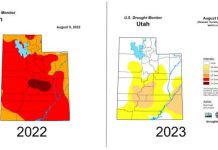
June 9 (UPI) — Global warming is likely to trigger a higher frequency of extreme weather — longer, hotter droughts and more intense flooding. Regions of Africa and the Middle East are expected to become too hot and dry to sustain large human populations.
It’s likely these global changes will increase competition for scarce resources and in some instances — in places where political stability is lacking — spark violence over food and water.
Researchers at Ohio State University have built a model to predict where climate change is most likely to trigger violence over food resources.
“A capable government is even more important to keeping the peace than good weather,” Bear Braumoeller, a political scientist at Ohio State, said in a news release. “We’ve already started to see climate change as an issue that won’t just put the coasts under water, but as something that could cause food riots in some parts of the world.”
Braumoeller and his colleagues developed a model to predict places that are likely to experience food scarcity and political instability, a double whammy that could prove deadly for vulnerable populations.
To better predict the future, researchers looked at how the two factors influenced violent uprising in Africa between 1991 and 2011. Braumoeller and his colleagues analyzed how rainfall and temperature yielded scarcity and triggered spikes in food prices. Their model showed extreme weather can trigger food shocks in disparate locations.
“We recognized that countries that imported food could be impacted by climate shocks in other parts of the world that suddenly increased prices, even if they weren’t experiencing any significant weather impacts themselves,” Braumoeller said.
The research findings — detailed in the Journal of Peace Research — proved a country’s wealth and political stability, as well its dependence on local agriculture and imports, influence its vulnerability to food shocks.
“We found that the most vulnerable countries are those that have weak political institutions, are relatively poor and rely more on agriculture,” Braumoeller said.





